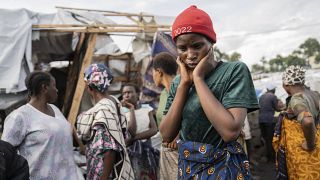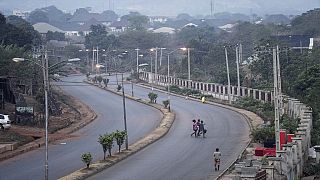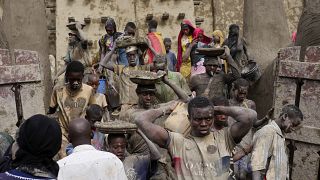Mali
The annual re-plastering of Mali’s Great Mosque of Djenne was held on Sunday, an important step in maintaining the integrity of the world’s largest mud-brick building which has been on UNESCO’s World Heritage in Danger list since 2016.
The mosque and surrounding town, a historical centre of Islamic learning and sister city to the more widely known Timbuktu, were added to the list due to ongoing insecurity in the centre of the country where Djenne is located.
Northern Mali was taken over by Islamist rebels in 2012, who were pushed back by French forces the following year.
But an Islamist insurgency took hold in Mali’s north and gradually moved into the center and south of the country over the next decade.
Mali’s main military camp, just 15 kilometers from Bamako, was attacked by Islamist militants in 2022.
The same year, Djenne’s annual plastering was nearly canceled entirely due to unrest.
Djenne’s mosque requires a new layer of mud each year before the start of the rainy season in June, or the building will fall into disrepair.
The plastering of the mosque is done by the entire city in a communal event, which in years past was a main attraction to the tens of thousands of tourists that visited Mali each year.
Amadou Ampate Cisse, a Djenne resident taking part in the event, said “the plastering of the mosque is a symbol of peace. The poor, the rich, everyone is here for this activity. We will continue this tradition from generation to generation. We will pass it on to our children and they in turn will do the same.”
Traditionally men and boys are responsible for climbing the mosque and putting the new layer of mud on it, while women and girls are responsible for fetching water from the nearby river to mix with clay to make more of the mud needed for the event.
Moussa Moriba Diakité, head of Djenne’s cultural mission, said that security is one of many challenges facing the town. “A lot of people talk about insecurity, and we hear that we can’t come to Djenne because there is insecurity,” he said.
As with the rest of Mali, Djenne’s tourism industry has all but completely disappeared due to the ongoing insecurity in the country. But the maintenance of the mosque is something that must continue “at any cost”, Diakité says, in order to preserve the country’s cultural heritage.











Go to video
Mali's Mohamed Camara suspended 4 matches after hiding anti-homophobia badge
02:20
Morocco: One of the world’s oldest universities draws global students
Go to video
Mosque attack in northern Nigeria leaves 8 people dead
Go to video
Mosque attack in Nigeria's north injures at least 24 people, including children
01:44
April 2024 breaks global heat records, Morocco prepares for scorching heatwave
02:00
Orthodox Christians in Ethiopia celebrated Easter [No Comment]